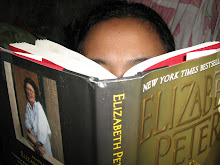I really must study Spanish. I keep wanting to study that language but never really got down to it. Since we Pinoys have a lot of Spanish words in our language (so does English, actually), I can get the gist of Spanish when reading or hearing it, but not really accurately. Lamentably, I am of the generation that no longer had Spanish as a compulsory subject in college, so I have to make do with cocina, cuchillo, cuchara and etc. :p
Anyway, the reason I am so peeved with my poor Spanish is because there are a lot of interesting old documents being published on Filipiniana.net, in the original Spanish text, that I am simply itching to read! (Gosh, that sounds like Mindy, the Wikipilipinas avator...) Really, I mean come on. I have always liked history, and who hasn't wanted to be a treasure hunter? Indiana Jones. Sydney Fox (Tia Carrere in Relic Hunter). Lara Croft. Brendan Fraser and Rachel Weisz in The Mummy. Allan Quatermain in King Solomon's Mines by H. Rider Haggard (yup, I read that!). Amelia Peabody and Radcliffe Emerson. Gabriela and Elias in Asian Treasures. Our fascination with the Golden Buddha and the Yamashita Treasure. Even Heinrich Schliemann and Troy, for goodness' sake. Many treasure hunts start with old documents. And also, the old documents are treasures in themselves. The knowledge they impart are is a treasure in its own right (makes me think of the ten scrolls in Og Mandino's "The Greatest Salesman in the World"--- love that book!).
One of the biggest shocks I have ever had in my whole life was reading about Andres Bonifacio being betrayed by the Katipunan he had worked so hard for. I forgot the title of the book, which my tita brought home from one of those librarian's conferences she often attends, when I was still in college (the late 1990's). Anyway, my knowledge of Andres Bonifacio was limited to this person so often depicted in paintings and monuments, the man who looked like a farmer in a camisa de chino and rolled-up trousers, with a red bandana around his neck, pointing forward with a bolo in his hand, his mouth open in a perpetual cry of "sugod mga kapatid!" (which is an apocryphal image, so historians now tell us). Who was Andres Bonifacio? Ah, isn't he that guy connected with the Katipunan? The one who tore up his cedula at the Cry of Balintawak? The guy who was orphaned young, who made and sold fans to keep his family alive, the one who brought up his younger brothers and sisters? The one who led the Revolution? His wife was Gregoria de Jesus, right? Bits and pieces of trivia-- that was all I knew about Andres Bonifacio. I never really got the picture of how hard it would have been for him, all the legwork that went into founding a secret society and keeping it alive enough to form the foundation for a revolution, the hard work that went into conducting the revolution itself, all because this man loved his country. He had a dream, and he wanted to make it real. In the end, he was betrayed and killed by people who later sold away his dream for their own personal convenience. After reading that book, I somehow wished that my knowledge about Bonifacio had indeed stopped at knowing he was the Supremo of the Katipunan and the Father of the Revolution, because reading about what happened to him later was like watching a really sad episode of "Maalaala Mo Kaya"... it left an ache in my heart.
Now, long years later, Filipiniana.net published the Philippine Revolutionary Records, all full texts of original documents from the Philippine Revolution, including the records of the Bonifacio court martial (gusto kong barilin si Aguinaldo, pramis!) and later Aguinaldo's justification of his order to have Bonifacio executed (gusto ko na talagang barilin si Aguinaldo, buti na lang patay na rin siya!) saying, in effect, that it was either him or Bonifacio, and like any person who wanted to preserve his own worthless hide, he chose himself, of course, wouldn't anyone else have done the same? (I wonder what Gat Andres would have done had the roles been reversed. And yes, he does deserve that "Gat" before his name!)
At least the Bonifacio Court Martial was in Tagalog (Pinoy na Pinoy) so I had no trouble reading it (the trouble was with my reactions to it, I mean it was all so long ago, but that doesn't help the indignation I feel!). Now Filipiniana.net has published the "El Indio Agraviado", written in 1821, which is considered the Manifesto, a first manifestation of Filipino nationalism. Original text is in Spanish, which is why I am so bummed about my Spanish-language skills! well, anyway, I guess I have to be content for now with the Google translation, although I do wish Filnet would publish a translation (sige na po...)!
"El Indio Agraviado" literally means "the injured native" --- we still use the term "agraviado" or "agrabyado" today to mean "disadvantaged". Anyway, the context of "El indio" was this: a "political scientist" states in the publication "Noticioso Filipino" that the educational system in the Philippines should be reformed because the native was ignorant, inept, inferior, a thief, and a lot of other epithets that make my ears smoke (pati bumbunan ko umuusok ah!), but then, if the native were educated he would use his learning to write against the Spaniards and feel like their equal. Argh. If you think today's people are bigots, try the 17th century! Thank Bonifacio and his companions for the Revolution, in fact while we're at it, thank all the nationalists who fought so hard for our independence.
Anyway, at least one of the "natives" this bigoted "political scientist" talked of must've been very indignant, because he denounced the statements of this person in a piece which is, you guessed right, "el indio agraviado", and el indio agraviado he must remain because the piece is anonymous and no one knows who this early nationalist really was. "El indio agraviado" said, among others, that if the natives are ignorant, it is the result of two and a half centuries under Spanish rule, and that a person is likely to become a thief if you deny him his rightful income. He goes on to say that the contemptuous attitude of the Spaniards towards the natives was unconstitutional because they all belonged to one nation. Now that's telling them!
Five Dramas That Are My Equivalent Of Comfort Food, Part 2
-
So, yes, well. I've added to my "comfort dramas" list in the meantime. You
know which ones I'm referring to... the dramas you tend to go back and
rewatch w...
12 years ago











